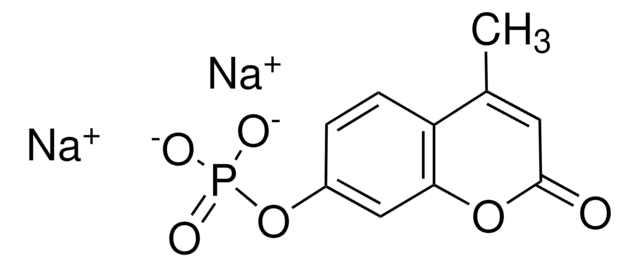T2141
L-Tyrosine 7-amido-4-methylcoumarin
≥98% (TLC), powder
Sign Into View Organizational & Contract Pricing
All Photos(1)
About This Item
Empirical Formula (Hill Notation):
C19H18N2O4
CAS Number:
Molecular Weight:
338.36
MDL number:
UNSPSC Code:
12352204
PubChem Substance ID:
NACRES:
NA.83
Recommended Products
Product Name
L-Tyrosine 7-amido-4-methylcoumarin,
assay
≥98% (TLC)
Quality Level
form
powder
solubility
80% acetic acid: 50 mg/mL, clear to slightly hazy, faintly yellow
storage temp.
−20°C
SMILES string
CC1=CC(=O)Oc2cc(NC(=O)[C@@H](N)Cc3ccc(O)cc3)ccc12
InChI
1S/C19H18N2O4/c1-11-8-18(23)25-17-10-13(4-7-15(11)17)21-19(24)16(20)9-12-2-5-14(22)6-3-12/h2-8,10,16,22H,9,20H2,1H3,(H,21,24)/t16-/m0/s1
InChI key
NRGJYQDVMUOJLU-INIZCTEOSA-N
Packaging
Bottomless glass bottle. Contents are inside inserted fused cone.
Storage Class
11 - Combustible Solids
wgk_germany
WGK 3
flash_point_f
Not applicable
flash_point_c
Not applicable
ppe
Eyeshields, Gloves, type N95 (US)
Choose from one of the most recent versions:
Already Own This Product?
Find documentation for the products that you have recently purchased in the Document Library.
Customers Also Viewed
B el Moudni et al.
Journal of medical microbiology, 43(4), 282-288 (1995-10-01)
A novel aminopeptidase was purified by high performance liquid chromatography from a cytosoluble 100,000 g extract of Candida albicans on the basis of its ability to cleave L-arginine 7-amino-4-methylcoumarin. The purification factor was 36 and the yield was 20%. The
Dilip Chandu et al.
Microbiology (Reading, England), 149(Pt 12), 3437-3447 (2003-12-10)
PepN and its homologues are involved in the ATP-independent steps (downstream processing) during cytosolic protein degradation. To obtain insights into the contribution of PepN to the peptidase activity in Escherichia coli, the hydrolysis of a selection of endopeptidase and exopeptidase
Rory E Morty et al.
The Journal of biological chemistry, 277(29), 26057-26065 (2002-05-15)
Aminopeptidases are emerging as exciting novel drug targets and vaccine candidates in parasitic infections. In this study, we describe for the first time an aminopeptidase from three highly pathogenic Leishmania species. Intronless genes encoding a leucyl aminopeptidase (lap) were cloned
Karolina Michalska et al.
FASEB journal : official publication of the Federation of American Societies for Experimental Biology, 29(9), 4071-4079 (2015-06-13)
Marine sediments host a large population of diverse, heterotrophic, uncultured microorganisms with unknown physiologies that control carbon flow through organic matter decomposition. Recently, single-cell genomics uncovered new key players in these processes, such as the miscellaneous crenarchaeotal group. These widespread
Our team of scientists has experience in all areas of research including Life Science, Material Science, Chemical Synthesis, Chromatography, Analytical and many others.
Contact Technical Service








